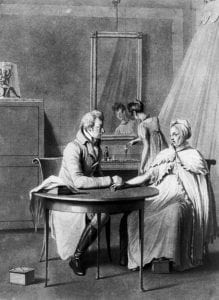Martin Duke
Mystic, Connecticut, United States
 |
| A doctor visiting a sick woman, and taking her pulse. |
Many years ago, in the mid 1980s, when I was still in clinical practice, I made a house call accompanied by a second year medical student who was coming to my office one day a week as part of her course in physical diagnosis. The patient I had been called to see lived alone in a small apartment in a housing complex for the elderly located in the outskirts of town. She had come to the United States from Europe when she was a teenager, had worked in the local silk mills, had married and raised a family, spoke English well, and had been a widow for many years. On arriving, I introduced the medical student to her as a “student-doctor.” Our examination showed that the patient was in early heart failure for which I had medications available in my doctor’s bag.
While using the telephone in a corner of the living room to make calls to the pharmacy for prescriptions to be delivered to the patient’s home and to check with my answering service for any further messages, I left the student and the patient together. They began a lively conversation, and from where I stood across the room I could hear occasional words—old, Poland, die, lonely, factory, heart, family. Soon they were both smiling and enjoying a cup of tea that they had prepared in the kitchen. I stayed a few extra minutes watching them, and on leaving told the patient I would be returning to see her again in a few days. She seemed disappointed when I explained that the “student-doctor” would not be with me at that time.
When the student next came to my office the following week, she gave me an envelope that I set aside to look at later. On opening it after supper that evening, I found a single sheet of paper on which the student had written a poem titled “House Call.”
Did God skip me over?
Aren’t I supposed to die?
Ninety-three is old enough to have survived.
My husband died so long ago
I can hardly remember why.
My daughter, she had polio,
My sister is gone too.
My son comes over once a week
To deliver me my food.
I came to America from Poland
When I was sixteen years old.
Right here I raised my family.
Right there I worked in a factory.
I’m not ready to go to a nursing home,
I can take care of myself.
So much I can’t remember
Of what was in my head.
So many times I go to a hospital.
My heart, it is bad.
Doctor, maybe I’m just lonely.
I know I’m very old.
I’m at peace with myself,
And ready now to go.
In this poem, the student had recognized and understood that the real problems of the patient were far more difficult to manage than heart failure alone and were far more complex—old age, loneliness, a failing memory, a loss of independence, and preparing herself for what was to come.
On arriving at my office the following day, I placed the poem in the patient’s medical file where it would remain alongside my medical notes as an important part of the patient’s medical record. The student had shown that she had many of the qualities of becoming a good doctor and a sensitive and caring physician in the years ahead. And from having followed her later career, I know that it turned out to be so.
Image: Watercolour: a doctor visiting a sick woman. Credit: Wellcome Collection. CC BY
MARTIN DUKE, MD, FACP, graduated in 1954 from the New York University School of Medicine in New York City. Following postgraduate training in medicine, pathology, and cardiology, he was in private practice in Manchester, Connecticut, from 1963-1993. During this period he served as Director of Medical Education and Chief of Cardiology at the Manchester Memorial Hospital, and held a teaching appointment at the University of Connecticut School of Medicine. He is the author of two books and over one hundred medical articles.

Leave a Reply